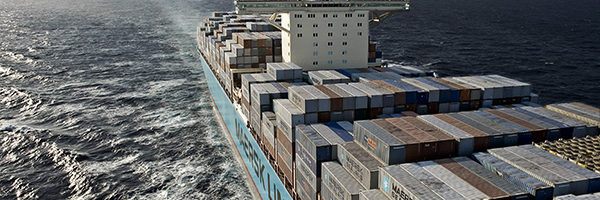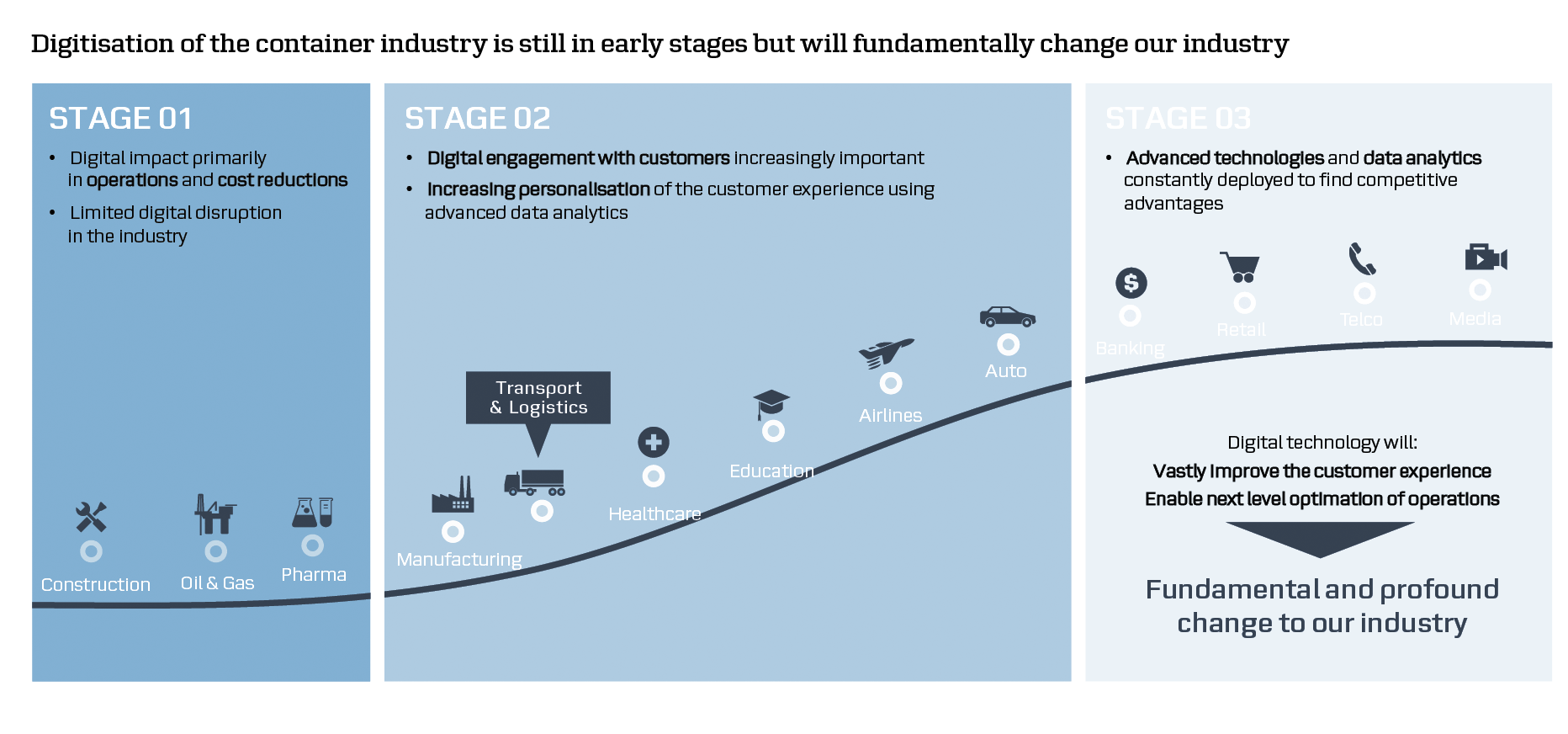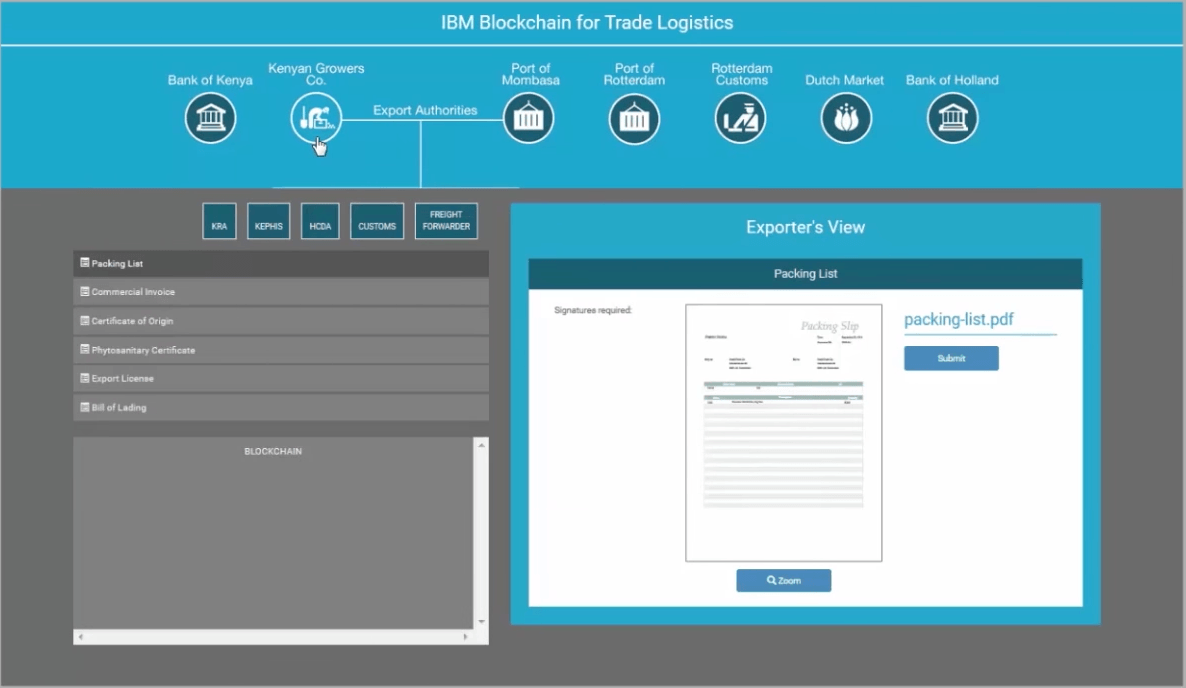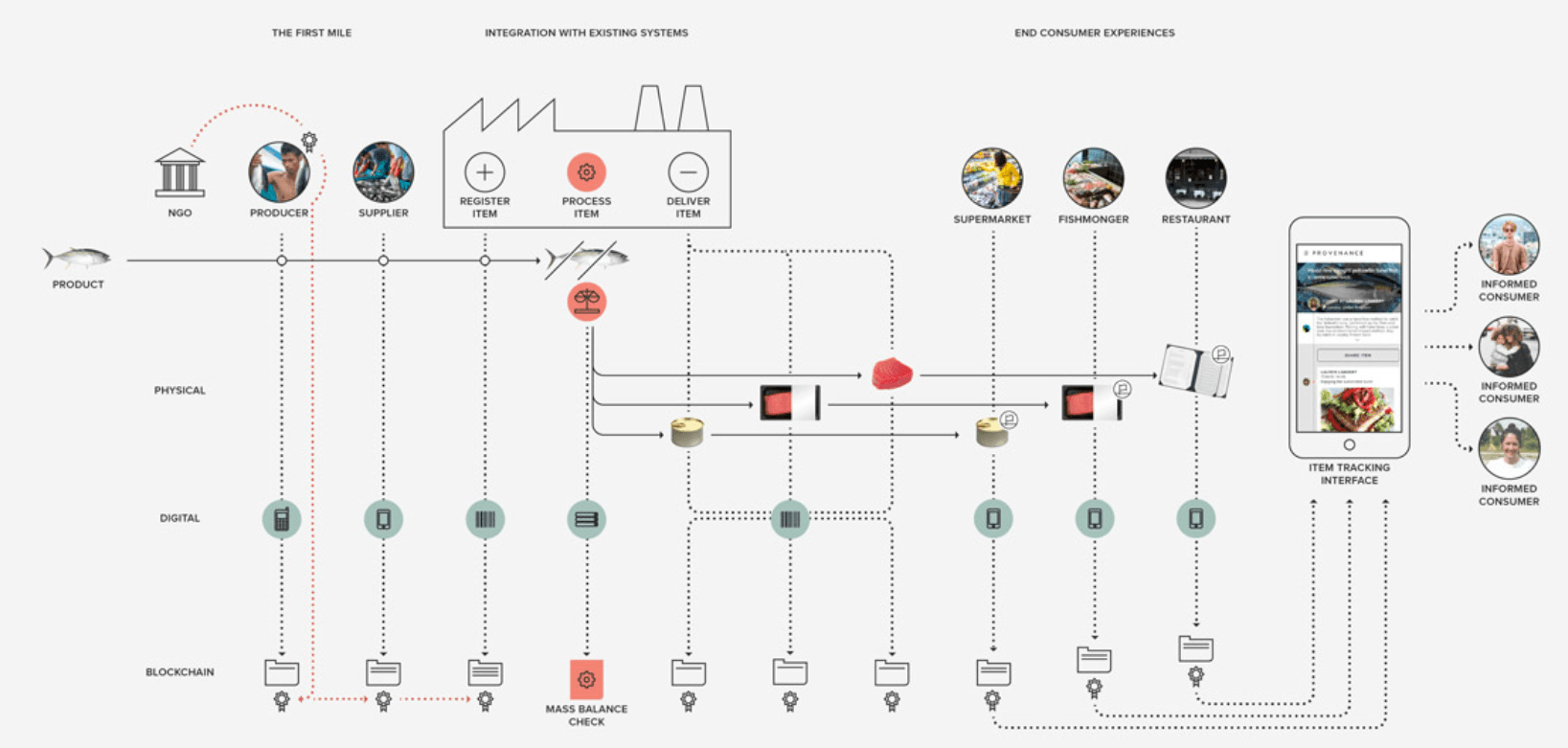Blockchain for Shipping -Is it Really Revolutionary?-

The world largest container shipping company has launched a blockchain project in 2017. Is it really revolutionary or is it just another old transaction system?
“I fear that we’ll build something that at the application layer looks like what Bitcoin and the Blockchain promised, but under the hood is just the same old transaction system.” [1]
Joi Ito, Director of MIT Media Lab.
Shipping Industry
90% of goods in global trade are transported by ships. The number of containers shipped through major routes was 184 million in 2015, and it is estimated to quadruple by 2030 [2]. It is clearly one of the most important transportation method in supply chain.
Together with its size, another characteristic of shipping is its complexity due to the number of parties involved, such as land transporters, freight forwarders, customs brokers, port authorities and etc. The shipping industry still heavily relies on paper documents for its communication among parties. It is estimated that the cost of trade-related paperwork processing cost roughly twice the costs of physical transportation [3]. Increasing efficiency through digitization could significantly reduce the cost of shipping.
Maersk is the world’s largest container shipping company, serving 59 thousand customers over the world and carrying 12 million containers per year. The company has assigned its first ever Chief Digital Officer in 2017 to tackle its digital transformation. The company sees that the transport and logistics industry is still in the early stage of digitization (Figure 1) and that digitization is an important pillar for growth in the future.
 Figure 1: Stages of digitization by industries [4]
Figure 1: Stages of digitization by industries [4]
Blockchain on Supply Chain
As part of its digitization process, in March 2017, Maersk announced a blockchain project in collaboration with IBM. The project has the potential to vastly reduce the cost and complexity of trading by using blockchain technology [5].
A resent research by Maersk shows that a shipment of flowers from Kenya to the port of Rotterdam required sign-off from 30 unique organizations and up to 200 communications [6].
 Figure 2: The sample image of the blockchain solution
Figure 2: The sample image of the blockchain solution
In parallel to the blockchain project, in April 2017, Maersk launched another project in collaboration with Microsoft. According to Microsoft, Azure (Microsoft’s cloud platform) has been selected for the digital platform of Maersk [7]. This announcement is striking, not because it is revolutionary, but because Microsoft is a direct competitor of IBM, with whom Maersk is working on the blockchain project. This fact illustrates that Maersk is still in an experimenting phase of its digital transformation. In a short term, Maersk will be working on blockchain together with other solutions, but the company has not fully committed to blockchain for its medium-term goal.
Potentials of Blockchain
The application of blockchain for Maersk is not so revolutionary. It is still early to conclude its significance, but the problem here is that blockchain is used to improve the current industry practice. This inherently limits the benefit of using blockchain. One of the most important features of blockchain is its ability to increase transparency; all of the transactions happen on blockchain platform could be seen by public and validated by all stakeholder involved.
Radical transparency could be problematic to Maersk, because the company could lose its competitive advantages by disclosing all the information. Currently, none of the actual data of the blockchain project is revealed to public. This could be the reason why blockchain technology is not fully utilized in many other industries despite its potential benefits.
What if a supply chain company could provide all the transaction information visible to public? It will open new business opportunities. A startup, called Provenance, is working to produce the solution for transparency in product supply chains (mostly for food and fashion brands). Unlike Maersk, Provenance is trying to create a new business model, based on blockchain. Essentially, what Provenance platform provides is the credibility of brands by increasing transparency of product supply chain [8]. IBM has started to work with major food supply chain companies such as Walmart, Unilever and Nestle to advocate greater transparency in the food system [9].
 Figure 3: Tracking tuna on Provenance’s platform [10]
Figure 3: Tracking tuna on Provenance’s platform [10]
Many of the examples above are BtoC businesses, but if greater transparency becomes the industry standard, Maersk will be forced to change its current business practice. It will benefit the company if Maersk starts preparing for the future by building a new business that allows transparency through its shipping transportation. Thus, my suggestion to Maersk is to build a new business unit that focuses on building a new supply chain solution using blockchain technology. If Maersk continues to focus on a narrow scope of blockchain technology (i.e. the current blockchain project), the company could misunderstand the actual potential of blockchain.
Further discussion
What brands other than mentioned above could benefit from transparency of their supply chains? What are the social conditions that accelerate the demand for perfect transparency in supply chain?
(791 words)
References
[1] Ito, J. (2017). My view on the current situation of Bitcoin and the Blockchain. [online] Available at: https://joi.ito.com/weblog/2016/02/22/my-view-on-the-.html [Accessed 11 Nov. 2017].
[2] Cit.com. (2017). Maritime Shipping Industry Statistics | Knowledge Center | CIT. [online] Available at: https://www.cit.com/thought-leadership/maritime-shipping-industry/ [Accessed 11 Nov. 2017].
[3] Sadouskaya, K. (2017). Adoption of Blockchain Technology in Supply Chain and Logistics. [online] p.30. Available at: https://www.theseus.fi/bitstream/handle/10024/126096/Adoption%20of%20Blockchain%20Technology%20in%20Supply%20Chain%20and%20Logistics.pdf?sequence=1 [Accessed 11 Nov. 2017].
[4] Maersk. (2017). Everything will be digitised. [online] Maersk website. Available at: https://www.maersk.com/stories/everything-will-be-digitised [Accessed 11 Nov. 2017].
[5] IBM. (2017). Maersk and IBM Unveil Supply Chain Solution on Blockchain. [online] Available at: http://www-03.ibm.com/press/us/en/pressrelease/51712.wss [Accessed 11 Nov. 2017].
[6] IBM. (2017). The Paper Trail of a Shipping Container. [online] Available at: http://www-03.ibm.com/press/us/en/photo/51713.wss [Accessed 11 Nov. 2017].
[7] Microsoft News Center. (2017). Maersk goes big in digital transformation with Microsoft | News Center. [online] Available at: https://news.microsoft.com/2017/04/26/maersk-goes-big-digital-transformation-microsoft/ [Accessed 12 Nov. 2017].
[8] Provenance. (2017). Provenance | Every product has a story. [online] Available at: https://www.provenance.org/ [Accessed 12 Nov. 2017].
[9] IBM. (2017). Blockchain for Food Safety. [online] Available at: http://www-03.ibm.com/press/us/en/pressrelease/53013.wss [Accessed 12 Nov. 2017].
[10] Provenance. (2017). Provenance | From shore to plate: Tracking tuna on the blockchain. [online] Available at: https://www.provenance.org/tracking-tuna-on-the-blockchain [Accessed 12 Nov. 2017].



Great post, Toshi!
It’s interesting to think about both the technical implications the question as well as the business/social implications of your post. As to the technical, I wonder how this will actually be implemented? E.g. if the blockchain is essentially a decentralized, secure ledger [1], how will it be used in this case? What sort of transactions will be written to this ledger, and when? What sort of ledger is currently used, and why is the blockchain better?
As you observe, Maersk is using the blockchain to pursue transparency, but why is it even necessary. If the blockchain is only a decentralized secure ledger, why is it necessary to use blockchain to impose transparency? Can a centrally-stored, non blockchain based ledger also be used for this purpose?
In short, I wonder if there is a genuine technical justification for the use of blockchain, or if it is merely for show. I suppose my technical background simply isn’t deep enough to really understand the technical implications of this technology and why/when it is necessary!
[1] https://blockgeeks.com/guides/what-is-blockchain-technology/
Toshi, this was a very interesting post!
In my opinion, the biggest barrier to implementation that I can see for a technology like this involves adoption by government agencies, especially in emerging markets. While the U.S. Customs and Border Protection agency is currently researching the use of blockchain technology in its future operations [1], and the potentials of blockchain as a leap-frogging technological agent for emerging markets has been explored by leading scholars [2], my own experience working with government agencies in countries in the Middle East and Southeast Asia has shown me that the institutional barriers to new technology adoption by government agencies are difficult to overcome.
From Maersk’s perspective, I can see why focusing on these new technologies makes sense. Similar to our IKEA discussion, Maersk was a leader in the environmental regulation reforms in the worldwide shipping industry over the last 20 years. In addition to the benefits to the environment, Maersk in effect raised the barrier to entry into the shipping business for potential competitors and the cost of operation for existing ones. I think that this technology will provide them with another competitive advantage.
[1] https://www.coindesk.com/us-customs-border-patrol-advisors-form-blockchain-research-effort/
[2] https://hbr.org/2017/05/how-blockchain-could-help-emerging-markets-leap-ahead
Toshi,
Fascinating take on an extremely relevant topic that I think all of us, myself included, need to educate ourselves on. Blockchain is a buzzword around here today, and businesses remain unclear on what role it will play in their strategies and operations. However, I have read that the transportation and logistics industry is one expected to benefit most from the technology. [1] I think you accurately point out the potential benefits: decentralized management of contracts (reduced costs for all players), accelerated and simplified contract exchanges (increased productivity for all players), reduced regulatory cost. I suspect blockchain transparency would benefit companies as well by helping resolve legal disputes. Anonymization and standardization, emblematic of blockchain technology, protect company trade secrets and create enforceable arbitration rules. While I agree that Maersk may not be approaching the technology in the most thoughtful way, I am impressed that in a slow-evolving industry they do recognize the potential benefits and have begun to experiment. I’ll be really curious to see how the blockchain develops over our time at HBS.
[1] https://www.ioti.com/transportation-and-logistics/blockchain-logistics-and-transportation-transformation-ahead
What. An. Article. The blockchain is fascinating and I fully believe this is one of those “internet-like” change coming to a theater near you, not some passing fad like fidget spinners. I agree with you that many firms will have a trouble switching to a fully transparent platform such as the blockchain. This will require a transformational push to disclose much information; however, I believe this can be accomplished by siloing certain parts of the business that are sensitive and changing their comfort level on information disclose. This technology will become increasingly important in counterterrorism efforts on their digital platforms so, in the long run, it will provide multiple benefits.
Additionally, the combination of the blockchain platform with autonomous ships (1) could help set Maersk far in front of the competition given their scale and subsequently larger upsides from these technologies.
The conditions that will incentivize a move to transparency will be the cost savings, efficiencies, counterterrorism assurance, and further integration to digital platforms. While this may be a difficult decision to make given that no one has made much progress in this space. The potential benefit is too large to leave on the table for another firm to capitalize on.
(1)https://www.nbcnews.com/mach/science/robot-ships-will-bring-big-benefits-put-captains-shore-ncna818941